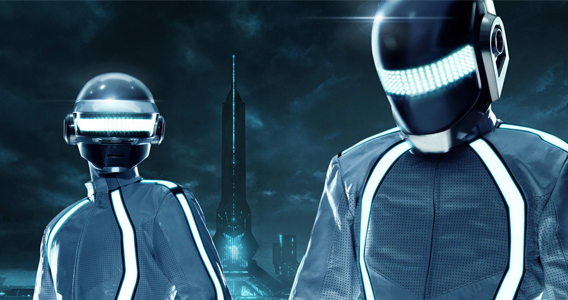
I didn’t exist when Tron hit theaters twenty-eight years ago, but elements of the film so permeate pop culture that it’s impossible not to be familiar with it, even if you’ve never seen it. When Tron: Legacy trailers began to disperse across the internets, intriguing me with their dark Daft Punk soundtrack and impressive amounts of shiny, I made it my business to go seek out the original film, so that I might be prepared to digest the sequel. Having seen Tron Guy and lightcycles and old jokes from The Simpsons and Family Guy, I wasn’t entirely sure what to expect.
It was weird. My impression was distinctly that the film would have been received very different in 1982, but now, as a twenty-something in 2010, there was a real problem. Nevermind dated effects; Tron was a film that only made sense in the loosest way, with simplistic and sometimes unclear ideas. The world of Tron was one that it wasn’t easy to grasp, because the film doesn’t really tell you what that world is. There’s no mythology there, only the bare bones of a concept to fuel a special-effects adventure.
I walked into Tron: Legacy looking for the concepts and ideas of the original film to be expanded and developed into a modern story that would satisfy my need for detail, for understanding, and for a mythology that simply didn’t exist in the original film. Sadly, Tron: Legacy makes a tradition of vagaries and half-ideas, equally unformed and unsatisfying.
Legacy follows Sam Flynn as he follows his lost father onto the grid, a digital space where programs and their interactions are represented as a physical world. There, Sam competes in lethal games and is pursued by Clu, a program created by his father to create the perfect system—and who, as a slave to that directive, has become something of a dictator on the grid.
I found myself wondering: what happens on the grid? We see programs competing in dangerous games and programs watching those games—but that’s not a world. What is this society of programs? Why do they have the games in the first place? What do they do when they’re not fighting and dying in the games? There’s a complete failure to communicate the basic truths and rules of this universe; the logistics, the way things work and why they work that way. Those who have not seen the original film will likely not understand how humans access and interact with this world, nor why these programs exist to populate it in the first place—so not only are the concepts not explored in an interesting or satisfying way, but their basics are not sufficiently communicated as to make logical sense.
Characters are equally basic, with only Flynn having much personality at all. Clu works as Flynn’s dark mirror, and could have made for a clever villain, had there been greater depth to the world and his place in it.

Fortunately, all is not lost: as you probably gathered from the trailers, Legacy looks incredible. Production design is unbelievable, and as visual art Legacy is a masterpiece—and I say that without a hint of exaggeration. Cleverly designed, exciting action sequences are rendered in a slick, beautiful world that’s just as bright as it is dark. The use of 3D may be trivial, but the film is wonderfully shot and realized through impressive effects—and the stylization of the grid is such that you’ll never feel like you’re watching a film made on a green screen. The grid is something you’ll want to reach out and touch, to live in—though, ultimately this makes the lack of exploration of this world even more bitter.
Daft Punk provides a pounding soundtrack that permeates the film and feels like having the sound of the future beamed directly into your consciousness. Easily one of the highlights of the film (along with a hilarious cameo by Daft Punk themselves), it provides an air of drama and gravity where the script often fails to, serving to elevate the entire product.
The highs and lows of Tron: Legacy roll out in roughly equal amounts, but I walked away feeling the failures more than the triumphs. Had it not been undercut by a thin script, Legacy could have become a science-fiction classic. Instead, the feeling is of watching an extended music video with the highest production values you’ve ever seen—fun and fantastic as it may be, it won’t satisfy the sci-fi fan looking for more.
Never saw Tron… even though I existed… though I was only 2… so I still wouldn’t have seen Tron. Not really interested either… especially the creepy Fake Jeff Bridges… (Fake Jeff Bridges looks fake…) I do wish I would have created my own Daft Punk robot helmet before Daft Punk created their robot helmets though… I’d be cool.
Comment by Ujn Hunter — December 21, 2010 @ 4:22 pm